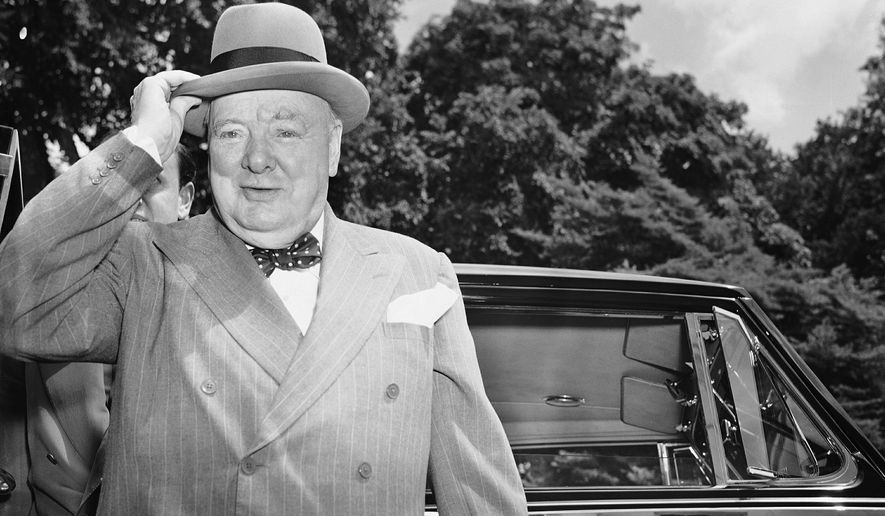OPINION:
In analyzing the leadership of British Prime Minister Winston Churchill in confronting the threat of Nazism in World War II, Professor Larry P. Arnn of Hillsdale College has made this observation. Churchill believed that the first lesson of war was the “profound significance of human choice and the sublime responsibility of men.”
For Churchill, the choice to go to war with Nazi Germany was one that bucked a trend in the United Kingdom to avoid conflict. Indeed, Churchill confronted precisely this when his government attempted to pressure him to enter peace negotiations with fascist Italy, a move the prime minister believed would lead to appeasement of and capitulation to Germany. In this regard, Mr. Arnn argues “It is not trends, but choices that matter most at the key moments of history.”
There are parallels today in America that reflect the pressure Churchill faced from his cabinet to eschew war. America is war weary. After two decades of fighting Middle East wars, people are hesitant to engage in yet another one, this time with a pestilential and militant Iran seeking hegemony in the Gulf region and beyond.
The American trend facing President Donald Trump is more isolationist now, having settled on the notion that our best interests are non-interventionist ones. Only when absolutely necessary should we engage our enemies militarily, and then with stand-off capabilities, not “boots on the ground.”
It’s a trend that views us as less a world policeman while regarding as inevitable the rise of powers like Iran, particularly in Eurasia. The challenge is that nations like Iran — which support terror while developing nuclear capabilities — threaten world peace. While the president’s “America First” program propelled him to the White House, he finds himself facing a profound choice. Follow the trend away from confrontation in the Middle East or confront a threat that, if unrestrained, can lead to more terror and proliferation by Iran.
Mr. Trump made a compelling case to disengage from foreign wars that sap American blood and treasure. His restraint in not overreacting to Iran’s downing of a U.S. Navy drone in June reflects that view. But Iran’s most recent attack against Saudi Arabian oil facilities argues forcefully for an unambiguous response by America and our allies to make clear that we will not tolerate such behavior. The president now must consider how that action takes shape.
First, he must reveal as much intelligence information as possible showing Iran’s direct role in this attack. It’s clear that Tehran sought to use their Houthi rebel surrogates as a cat’s paw to portray the attack as an extension of Saudi Arabia’s war with the insurgents in Yemen. The forensic analysis of the missiles used in the attack should prove otherwise and the president must show that irrefragable evidence to the public to build support for military action. We must not repeat the flawed intelligence scenario of the most recent war in Iraq.
Second, as Secretary of State Mike Pompeo is doing now, the United States must build a coalition of resolve with our allies in Europe and the Gulf region so that this does not become a unilateral American action. Europe has been hesitant to be tough on Iran. That must end in light of Iran’s overt armed belligerence toward Saudi Arabia. Moreover, we must not involve Israel, which would doom Arab participation in any action.
Third, any military response should be proportionate yet punishing. Iran must not escape responsibility for this act of war.
Fourth, the president must continue diplomatic efforts up until it is clear that Iran has no interest in negotiating. President George H.W. Bush did so in the First Gulf War, and it strengthened his hand in pursuing the inevitable.
Fifth, the president should to the fullest extent retain his agility to pursue events as they unfold. A military response — properly configured — can have both devastating results on selected targets, but also a salutary effect on Iran’s terror mullahs. They are teetering on survival. A military strike might hasten their fall in a popular revolution. If it does, the coalition must have a plan to bring stability and support to a new Iranian regime committed to membership in a community of peaceful nations.
Recently, President Trump observed, “I’m not looking to get into new conflict[s]. But sometimes you have to.” We are at a significant point of decision in history and the president faces a Churchillian moment. He must make a choice that is indeed profound, one that reflects the sublime responsibility he has as president and leader of the free world. Let us hope, that as he considers his choices sitting next to the bust of Winston Churchill in the Oval Office, that he resist the trends that would pull him away from what must be done about Iran. Si vis pacem para bellum.
• L. Scott Lingamfelter is a retired U.S. Army colonel, combat veteran and Middle East Foreign Area Officer. He also served in the Virginia General Assembly.




Please read our comment policy before commenting.